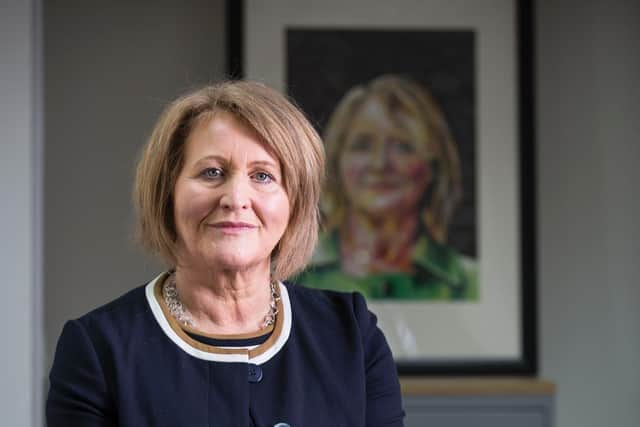What are the real reasons secondary schools in Leeds are judged to be under-performing?
and live on Freeview channel 276
Figures have been published which list the overall performance at the end of key stage 4 in 2019 for all pupils at Leeds secondary schools and others across the country.
A more in-depth look at the Progress 8 score reveals how much progress pupils made between the end of key stage 2 (primary school) and the end of key stage 4, compared to pupils across England who got similar results at the end of primary school.
Advertisement
Hide AdAdvertisement
Hide AdDiscounting the city's special schools, those falling into the bottom ten in Leeds are a mix of academy and mainstream establishments.


However, education experts have been quick to question the tables as they don't reveal what really goes on in schools.
In fact, Leeds is above the national average when it comes to the Progress 8 score despite claims that some children growing up in the North face a double whammy of living in areas of "entrenched disadvantage" and going to schools that are really struggling, compared to a 20 year drive to raise school standards in London.
It has been claimed that the key stage 2 achievements have been "falsely inflated" which then set up a pattern for failure in secondary school.
Advertisement
Hide AdAdvertisement
Hide AdHelen Bellamy, is a case worker for the National Education Union (Leeds). She said some schools are "jumping through hoops to get the results".


"Secondary teachers of English and maths are having to build on falsely inflated SATs results which are used to set GCSE targets. These are overly inflated due to the pressure on primary schools to do well and to rate highly on league tables. The curriculum is narrowed in upper primary particularly, to achieve this and often children attend booster sessions at lunchtime or before and after school."
She says that once other core subjects are brought back at secondary school it becomes difficult to maintain that level of achievement. However, there is pressure on teachers to get results which increases staff stress levels and possible absence from work for that reason.
Ms Bellamy added: "High workload causes teacher absence through work-related stress and also leads to teachers leaving the profession. This impacts schools in terms of children’s progress, well-being and finances.
Advertisement
Hide AdAdvertisement
Hide Ad"There are now for the first time, more teachers not teaching than teaching and for the third year running teacher recruitment targets have been missed."


Away from the class-room there are other factors which may affect pupils such as language barriers, poverty and cultural experiences.
Coun Jonathan Pryor is the executive member for Learning, Skills and Employment at Leeds City Council and says that children in Leeds are actually doing better than their peers across the country.
He explains: "Leeds has been above the national average for the third year running. While these [figures] are relative to each other, nationally, Leeds is above average and that is something we have been really pleased about."
Advertisement
Hide AdAdvertisement
Hide AdHowever, he said that with Leeds having such a diverse social make-up there are many reasons why school performances may get distorted.
Coun Pryor added: "There are real close links between poverty and educational attainment. Somebody told me this years ago and it has stuck with me, children spend 15 per cent of their time in school. the other 85 per cent of the time - what really affects their learning? Do they arrive [at school] ready to learn or not?
"In Leeds we have got diverse areas of high wealth and deprivation. Some might live in a house that is over-crowded, with parents working two to three jobs on zero-hours contracts and they don't have time to help with home-work compared to a child with a stable family and parents that help with things.
"At some schools for 60 to 70 per cent of children, English is their second language. That school maybe doing really well with the kids that they have got but they will always be more difficult to teach than a group of children that learned English from birth. If they take the same tests as someone who learned English three years ago there is going to be a difference.
Advertisement
Hide AdAdvertisement
Hide Ad"In Leeds if you go to different schools in different areas there are really stark differences in demographic breakdowns. It shows how league tables aren't the whole picture. Some schools lower down the table have still been judged to be good schools by Ofsted and that is because Ofsted looks at a more broader picture."
However, Anne Longfield, the Children’s Commissioner for England has called for a "relentless focus" from the Government and local authorities to drive up standards by drafting in more teachers, extra tuition and earlier intervention into special needs.
She told the Yorkshire Evening Post: "Some children growing up in the North face a double whammy of living in areas of entrenched disadvantage and going to schools that are really struggling. While many schools in the region are doing brilliantly there are also too many that are not.
“Every child growing up in the North deserves the best chances to do well. So I want to see a relentless focus from the Government and councils on improving those schools that have fallen behind.
Advertisement
Hide AdAdvertisement
Hide Ad"That means help with recruitment so that top teachers are attracted to work in struggling schools, extra tutoring for those kids falling behind from a young age and help for parents finding it hard to provide the support their children need to do well at school. We need to see more investment in early years support, an end to the postcode lottery for services like speech and language therapy and quicker identification of children with Special Education Needs alongside proper investment in their educational needs.
“So much has been done to raise standards in London schools over the last twenty years, and with the same focus and investment there is no reason why schools in the North can’t make the same progress. The Government can show it’s serious about delivering for the North by giving a rocket boost to our children’s prospects.”